Copycat Blu-ray Movie
HomeCopycat Blu-ray Movie 
Warner Bros. | 1995 | 123 min | Rated R | Aug 02, 2011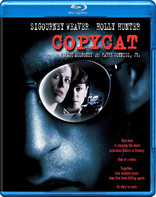
Movie rating
7.1 | / 10 |
Blu-ray rating
| Users | 4.1 | |
| Reviewer | 3.5 | |
| Overall | 3.7 |
Overview
Copycat (1995)
Helen Hudson is a brilliant forensic psychologist who specializes in the study of serial killers. After one of her subjects attempts to kill her, Hudson suffers a nervous breakdown and becomes agoraphobic. However, when a series of ritualized murders baffle the San Francisco Police Department, M.J. Monahan, a feisty, intelligent detective, turns to the unwilling Hudson for help in finding the killer. The team of doctor and detective becomes a target when their quarry learns who is on his trail.
Starring: Sigourney Weaver, Holly Hunter, Dermot Mulroney, William McNamara, Harry Connick Jr.Director: Jon Amiel
| Psychological thriller | Uncertain |
| Mystery | Uncertain |
| Thriller | Uncertain |
| Crime | Uncertain |
Specifications
Video
Video codec: MPEG-4 AVC
Video resolution: 1080p
Aspect ratio: 2.40:1
Original aspect ratio: 2.39:1
Audio
English: DTS-HD Master Audio 5.1 (48kHz, 24-bit)
French: Dolby Digital 5.1 (640 kbps)
Spanish: Dolby Digital 5.1 (640 kbps)
German: Dolby Digital 5.1 (640 kbps)
Portuguese: Dolby Digital Mono
Spanish=Castillian
Subtitles
English SDH, French, German SDH, Portuguese, Spanish, Dutch
Discs
25GB Blu-ray Disc
Single disc (1 BD)
Playback
Region free
Review
Rating summary
| Movie | 4.0 | |
| Video | 3.5 | |
| Audio | 3.5 | |
| Extras | 2.5 | |
| Overall | 3.5 |
Copycat Blu-ray Movie Review
He Isn't Dexter, He Doesn't Have a Code, and There's Nothing Nice About Him
Reviewed by Michael Reuben August 16, 2011Copycat is often compared to The Silence of the Lambs, but its plot is really closer to Manhunter. Silence was not just about a serial killer, but also about a rookie FBI agent whose inner struggle with self-doubt provided as much of the drama as the investigation on which she was tagging along. The two heroines of Copycat are both long-time veterans of law enforcement, one of whom has retired after almost being killed because of a prior case. Then she's forced out of retirement by a new case that seems tailor-made for her skills (and, indeed, turns out to have been made just for her). That puts her much closer to Manhunter's Will Graham than Silence's Clarice Starling. One of the questions hovering over Copycat is the same one hovering over Manhunter (and, to some extent, over Hannibal, the sequel to Silence): What price does this work exact from the people who do it? But not just people in general: female people. The real reason Copycat is so often compared to Silence is that both have female leads, and that makes all the difference in a genre where the villain is almost always a man hunting women. In Silence, Dr. Lecter asks Starling to state the most basic thing the killer does, but when she replies: "He kills women", Lecter corrects her like a stern professor: "No, that is incidental." Well, it may be incidental to Lecter, but it isn't to Starling, who, unlike Lecter, is another entry on the long list of potential victims. Similarly, in Copycat, both lead characters take the case personally, even before they realize that the killer they're pursuing has developed specific plans involving both of them. (And no, that's not a spoiler.)
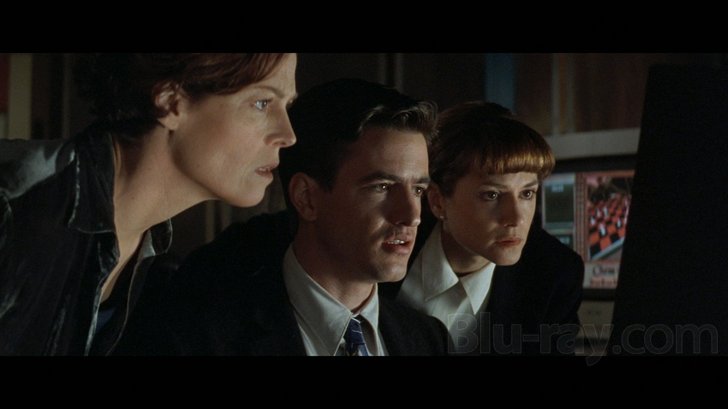
Dr. Helen Hudson (Sigourney Weaver) is a noted forensic psychologist specializing in serial killers. The author of several bestsellers, Dr. Hudson is much in demand on the lecture circuit and also serves as an expert witness at murder trials. Most recently, her testimony helped defeat the insanity plea of Daryll Lee Cullum (Harry Connick, Jr., playing against every type with which he's ever been associated) and send him to death row. Daryll Lee threatened revenge, and as the film opens, he has escaped prison, evades Dr. Hudon's police escort and attacks her following a lecture. Dr. Hudson narrowly escapes, but she is so traumatized by the experience that she withdraws into her luxurious San Francisco apartment and doesn't come out again. In clinical terms, she suffers from "agoraphobia", or fear of the outside. Thirteen months later, the SFPD is investigating a series of apparently random murders of young women, linked only by the same bizarre M.O. Lt. Quinn (J.E. Freeman), a veteran of the Zodiac case, insists that no one on the force even utter the words "serial killer", but he knows that's what they have. So does the officer in charge of the case, Inspector Mary Jane "MJ" Monahan (Holly Hunter), who is frustrated, because she and her partner, Reuben Goetz (Dermot Mulroney), are getting nowhere, but Quinn won't let her ask for help from the FBI or anyone else. Though secluded within her home, and constantly ingesting pills and booze to control her anxiety, Dr. Hudson can't break the habit of reading crime news, listening to her police scanner and pulling information from the internet. She keeps calling Monahan's office with theories and tips, until eventually Monahan traces the calls and shows up at Hudson's door with Reuben trying to enlist her as a consultant. Hudson shoos them away, but Monahan is famous for her persistence:
Hudson: Does she do this . . . this wide-eyed little-girl routine often? Goetz: Yeah. Hudson: Does it work? Goetz: Sometimes. (together) Monahan: Umm . . . usually.When Dr. Hudson first sees the gruesome crime scene photos, she suffers a panic attack, but her friend and live-in caregiver, Andy (John Rothman), tells the inspectors to leave the files, and eventually the doctor composes herself enough to review them. She makes a startling discovery. The killer has replicated the crime scenes of the infamous "Boston Strangler" down to the minutest detail. He's not only a copycat; he's a historian, a craftsman and, at least in his own mind, some sort of artist. From this point forward, Monahan and Hudson work closely together, despite the growing disapproval of Monahan's lieutenant and, eventually, the police commissioner. Monahan quickly senses what the audience knows well in advance -- namely, that the case is somehow about Dr. Hudson, because who else would truly grasp the "quality" of the killer's work? ("I'm the fucking muse of serial killers!" Hudson shouts, with equal parts anger and disgust.) As for the killer's ultimate goal, it doesn't take much imagination to guess that whatever his plan may be, it won't be good for the doctor's health. This criminal is as much stalker as serial killer. He may not be the doctor's old nemesis, Daryll Lee Cullum, who remains securely on death row, but that old bogeyman manages to resurface by video conference, invoking the Lord and still making threats. (Harry Connick, Jr. told the director that he based the character on someone he knew growing up, which is a disturbing thought all by itself.) Copycat isn't a "whodunit", because we're introduced to the villain about 45 minutes into the film, and he's no one special (which is precisely the point Dr. Hudson makes in her lectures). Then, in classic Hitchcock fashion, we're given plenty of information to keep us tense, while the characters, who know less than we do, keep walking into jeopardy. Most of the violence happens off-screen, but it's disturbing even when we only see the aftereffects, because it's so obviously calculated, sadistic and pointless except that the victims' suffering gives pleasure to the killer. Sigourney Weaver made her cinematic reputation playing tough women like Ripley and Dian Fossey, but here she plays someone barely hanging on. It's fascinating to watch Weaver rearrange many of the same qualities we know so well (the sarcasm, the cutting voice, the quick anger) into someone who's drowning in self-pity, but finally has to pull herself together if she wants to survive. The director, Jon Amiel, finds a visual equivalent for Dr. Hudson's mental state with odd angles and unusual Steadicam movements that disorient without creating the "shakey cam" effect that has become almost a visual tic in contemporary filmmaking. Holly Hunter made her name with a big voice in films like Raising Arizona and Broadcast News, but won her Oscar with silence in The Piano. In Copycat she charts a middle course for Monahan, making her voice as diminutive as her stature ("the wee inspector", Dr. Hudson calls her). Monahan greets everyone on the force by name, pays attention to everything happening around her, and does everything in her power not to make a mistake -- and to correct them when she does. (One such mistake was an office romance with another inspector, "Nico" Nicoletti (Will Patton), who isn't taking the break-up well.) Early on, Monahan tells her partner, Reuben, that a cop should never take a human life. In the course of the film, she'll be presented with situations that prompt her to question that belief, and by the end she'll have reevaluated her entire approach to police work.
Copycat Blu-ray Movie, Video Quality 
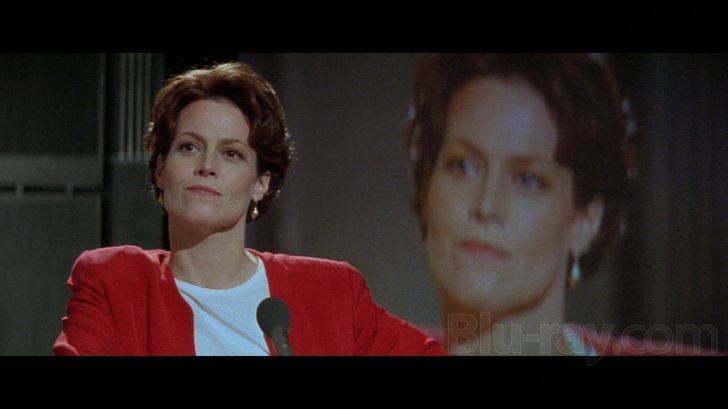
Copycat was shot by the late László Kovács, and it somehow seems appropriate that a film which prominently features a celebration of the 25th anniversary of the so-called "Summer of Love" was photographed by the cinematographer of Easy Rider. The 1080p, AVC-encoded Blu-ray captures the rough, slightly grainy but detailed texture of Kovács' images, which run the gamut from the spotless white ladies room where Daryll Lee attacks Dr. Hudson, to the green public spaces where celebrations are being held, to the barren hilltop where the killer displays one of his victims, to the darkened interiors of Dr. Hudson's apartment. Black levels and shadow detail are good even in the darkest scenes, and this is especially important in Copycat, where Kovács frequently achieved impressive depth of field even though he was using anamorphic lenses. Colors are vividly differentiated but not oversaturated. (I am aware that another site's review complained about unstable reds, but a red dress worn by Dr. Hudson plays a key role in the film, and it looked fine on my 72" screen.) If there is any criticism to be made of Warner's effort, it's that a film running over two hours should never be crammed onto a BD-25, especially with the large assortment of audio options that Warner has included. After looking very carefully at both the image in motion and at screen captures accompanying this review, I could not detect any DNR or other digital filtering intended to simplify the compressionist's job. However, light filtering can be difficult to detect in the absence of an unfiltered source for comparison, and I was struck by how quickly the image lost cohesion when one zooms in on still shots. It would not surprise me to find that the Blu-ray of Copycat looks considerably less appealing when projected on a large screen. This should not necessarily deter a purchaser today, but I share Robert Harris' view that every Blu-ray should be playable with equal quality on any size screen.
Copycat Blu-ray Movie, Audio Quality 
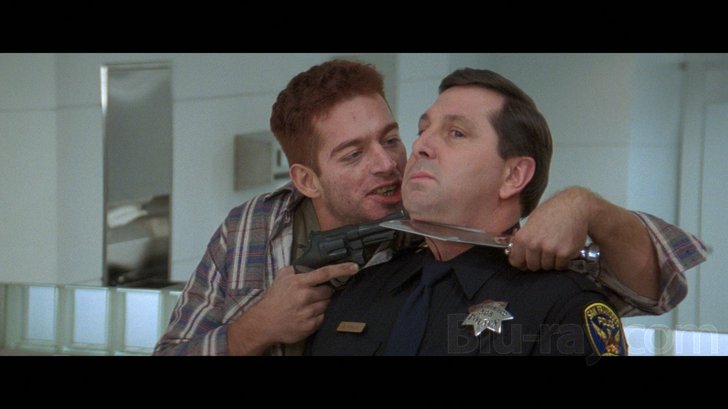
The sound editing for Copycat is subtle and sophisticated, but the 5.1 track, presented here in DTS lossless, makes almost no use of the surrounds. The film's credits indicate that it was released in Dolby Digital surround, but the DVD's credits state that the sound had to be "remastered" for DD 5.1; therefore, it's possible that the original soundtrack was limited to stereo, which would be consistent with the film's relatively limited budget and would account for the front-centered nature of the 5.1 mix. In any case, voices are clearly rendered, as are atmospheric changes in sound that reflect changes in point of view, particularly as Dr. Hudson's fragile psyche reacts to various developments. The score by Christopher Young (Drag Me to Hell) is particularly good, evoking such disparate sources as Bernard Hermann, Michael Small in Klute and classical composers. The Police's "Murder by Numbers" features prominently at one point, because the killer uses the lyrics as a message (and a taunt). At least he has good taste in music.
Copycat Blu-ray Movie, Special Features and Extras 
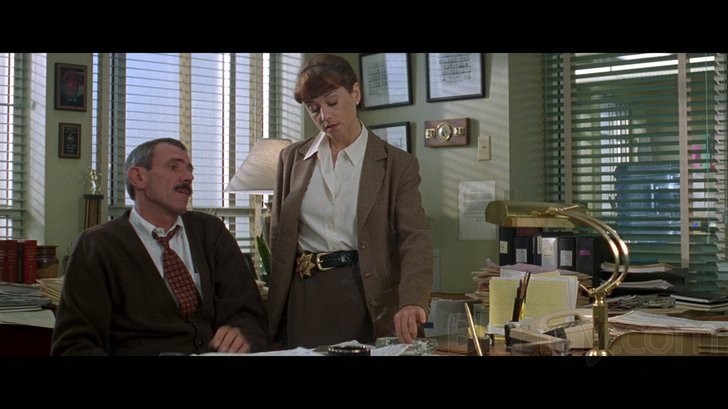
The extras have been ported over from the 1998 DVD.
- Commentary with Director Jon Amiel: Amiel sticks closely to the action on screen, which results in too many pauses, especially in the latter half of the film. However, in describing what he sees, the director drops interesting details about his filming techniques, the actors' approaches to performances and his own views on the material and story. He also describes earlier versions of the script, when M.J. Monahan's character was a man and the story centered on a romance between the inspector and Dr. Hudson, and refers to a few deleted scenes, including a flashback to the killer's childhood, which unfortunately have never been included on any release.
- Theatrical Trailer (SD; 1.85:1, enhanced; 1:56): It was an odd choice to use the theme from Interview with the Vampire, but the music set an interesting tone.
Copycat Blu-ray Movie, Overall Score and Recommendation 

In her commentary to the Criterion laserdisc and DVD of The Silence of the Lambs, Jodie Foster drew parallels between that film's plot and classic fairy tales, where slaying a monster serves as a rite of passage to adulthood. Copycat does not connect to any such redemptive mythology. Its dominant metaphor for serial killers is contagion. Dr. Hudson compares them to a mutating virus, and the film's final shot is of Daryll Lee Cullum, secure in his jail cell but writing to one of his many admirers. A character in Copycat claims that more books have been written about Jack the Ripper than Abraham Lincoln, and whether or not the statistic is true, it reflects the film's pessimistic mindset - or perhaps its realism. Copycat may not be as brilliantly stylized as David Fincher's Se7en, and it didn't add a new character to the popular imagination who could rank with Hannibal Lecter, but its horrific murders were taken from real cases, and the perpetrator wasn't memorable precisely because he was so realistically ordinary. That, in addition to exceptional lead performances, is why the film leaves such a chill in its wake. With the caveats noted above regarding the Blu-ray's technical merits, the disc is recommended.
Similar titles
Similar titles you might also like

Taking Lives
Extended Cut
2004

The Pledge
2001

Vertigo 4K
1958

Blink
1993

Basic Instinct 2
Collector's Edition
2006

Don't Say a Word
2001

Kiss the Girls
1997

Rear Window 4K
1954

In the Cut
20th Anniversary Uncut Director's Edition
2003

Shadow of a Doubt 4K
1943

Hangman
2017

Contagion
2011

Se7en 4K
Seven 4K
1995

The Girl on the Train 4K
2016

Bunny Lake Is Missing
1965

The Brave One
2007

The Fall: Series 1
2013

Searching
2018

The Raven
2012

Insomnia
2002
